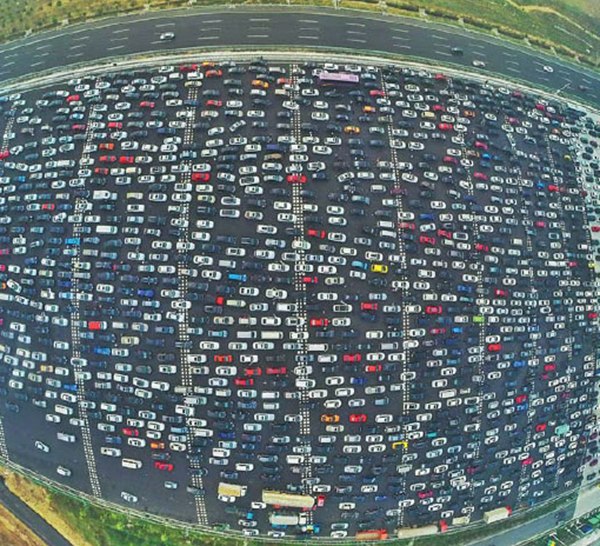
Severe traffic congestion at a highway toll station is a common sight in Beijing. Local authorities are working on solutions to ease traffic pressures in the city. (Fu Ding/For China Daily)
Beijing has worked out preliminary policies for a congestion charge in the city. The progress was confirmed by Beijing Municipal Environmental Protection Bureau and Beijing Municipal Commission of Transport at a recent meeting to discuss the capital's air pollution.
Based on the similar approaches taken by Singapore, London and Stockholm, Beijing's congestion charge policy, which remains in deliberation, is designed to cut the use of vehicles in the capital, especially during rush hours, and so reduce the air pollution due to vehicle emissions. The capital now has more than 5.6 million vehicles, which discharge at least 700,000 tons of pollutants every year.
Wu Hongyang, deputy chief of the Urban Transportation Research Center under the Ministry of Transport, said once Beijing implemented a congestion fee policy, other cities and regions would soon do likewise.
The heavy congestion in major cities has a lot to do with poor urban planning, but its root cause lies deeper. The daily pressure on the use of public roads is the result of both middle- and low-income commuters who cannot afford to live near where they work (usually in the city center), and have to take public transportation or drive to their workplace, and those who live in the center who can afford to and prefer to drive to work.
Imposing a fee on drivers seems to be a feasible solution to cut their car use, but it is unlikely to work even after the fees are collected, as several failed similar attempts have proved over the past decades. For example, some economists tend to blame the toll-free policy applied to highways during national holidays for the traffic jams that occur at these times, because it "encourages more people to drive out".
But the truth is, canceling the highway tolls during the holidays was intended to alleviate the foreseeable congestion, as an increasing number of Chinese citizens are inclined to drive their cars on excursions during the public holidays. Charging the tolls would only make the traffic jams worse because there would be tailbacks from the toll booths.
Indeed, some foreign cities have managed to reduce traffic by means of a congestion charge, as transportation hubs on the edge of the congestion zone allow those living on the outskirts to drive to these and then use public transportation to travel the rest of the way.
But this is hardly the case in Chinese mega cities such as Beijing, because most car-owners live in the city center and would not be happy if they are charged to drive. More likely, where feasible, drivers would try to bypass the "charging zone" during rush hours, leading to severer congestion elsewhere in the city.
Therefore, collecting a congestion charge is unlikely to reduce the number of cars on the capital's roads, which requires an overhaul in urban management. Even if a fee is charged to drive in the city center, more measures need to be taken to upgrade public transport to accommodate the travel needs of middle- and low-income residents.
The author Tang Jun is a social policy researcher with the Chinese Academy of Social Sciences. This article is an excerpt of his interview with China Daily's Cui Shoufeng.


















































